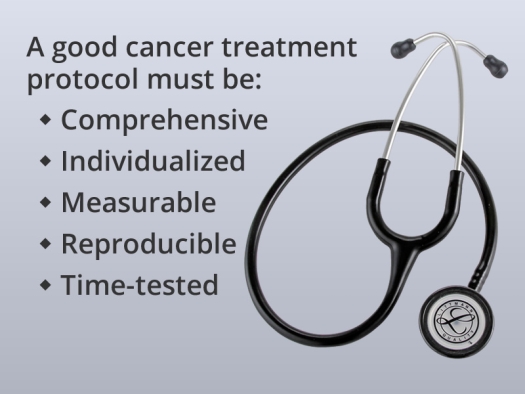GoodCancerTreatmentProtocol.jpg

Stethoscope image from pngimg.com / CC BY-NC 4.0
I do not believe we will ever find a universal cure for cancer. Allow me to explain.
As a fully trained medical doctor with postgraduate training in hematology/oncology, my journey has been unique. I spent several years in medical school learning how to make accurate diagnoses. During residency and fellowship, I learned the various treatment algorithms for cancer chemotherapy, radiotherapy and immunotherapy.
Then I made the shift to integrative oncology, and I appreciated the impact of nutrition on health and healing. My first introduction was to the Gerson Therapy®, a nutritional programme created by Max Gerson, M.D., (1881-1959), a German medical doctor. It was difficult at first, but I slowly became skilled at designing a good nutritional protocol for a patient with cancer.
Yet, in addition to my active pursuit of this knowledge, I was passively noticing trends and patterns. These were universally applicable to every patient. Beyond the debates about the best new drug or the best natural supplement, there were five parameters that cut through the noise.
In my opinion, every effective cancer treatment protocol must possess these five qualities. It really doesn’t matter whether the treatment is ‘conventional’ or ‘alternative’. A good cancer treatment protocol must be:
- Comprehensive
- Individualized
- Measurable
- Reproducible
- Time-tested
Let us elaborate.
Comprehensive
Even in states of health, your body straddles a delicate balance between nutrition, inflammation, and detoxification. When disease occurs, it simply means that your body is unable to regulate itself well enough to maintain this balance.
In the case of cancer, it is widely accepted that toxic chemicals can contribute to cancer development. However, medical treatments (even non-conventional ones) tend to focus on destroying the cancer cells, often ignoring your body’s need to repair damaged tissue and dispose of the toxic waste.
Similarly, the latest wonder herb or super supplement will not single-handedly provide ALL the nutrition you need to recover.
A good cancer treatment protocol must incorporate adequate nutrition, immune system support for repair, as well as a way to assist the body with detoxifying the waste created. In fact, each part of the protocol should work hand-in-hand with the other, to achieve the common goal of cellular healing.
(As a side note, I firmly believe that there is an emotional root to cancer. These are negative emotions and they also need to be ‘detoxified’” via emotional wellness coaching).
Individualized
A good cancer treatment protocol must treat THE PERSON, not the cancer. You have a unique metabolic type, which dictates how your body responds to your environment. The most convincing explanation I have come across is The Gonzalez Protocol®, developed by Nicholas Gonzalez, M.D., (1947-2015).
Gonzalez built on the medical research of Dr. John Beard, Dr. William Donald Kelley, and Dr. Weston Price. He suggested that our bodies, when stressed, swing either to ‘fight or flight’ mode (sympathetic mode) or ‘rest and digest’ mode (parasympathetic mode). These occasional swings are fine, but, if we get stuck in one mode or the other, we develop disease.
Gonzalez realized that nutrition plays a major role in helping our bodies return to a state of balance, where we can fight off disease. Therefore, a person with a sympathetic-dominant metabolic type needs the alkalinizing benefits of a vegetarian diet, and only small amounts of meat
In contrast, a person with a parasympathetic-dominant metabolic type needs the opposite i.e. a diet rich in animal protein, and not as much plant-based food. This is a revolutionary concept, in a world where there are so many voices claiming to have discovered cancer cures. While one group recommends a vegan diet for ALL persons with cancer, another group strongly recommends the ketogenic diet as a cure.
The answer is found in the middle, by matching the correct diet to your unique metabolic type.
Measurable
Lewis Carroll famously said “If you do not know where you're going, any road will get you there”. When you have just been diagnosed with cancer, you already know where you are: you have cancer. You also have a vague idea of where you want to be: cancer-free.
It is common for friends and family to give you a million suggestions. “Try this off-label drug”, or “Eat this fruit” or “Drink only juice”. All of these options promise to get you to be ‘cancer-free.’
However, how do you know if you are moving towards this ‘cancer-free’ state? What tangible parameters do you use to track your progress?
Is it your CT imaging? PET scan? Circulating tumor cells? Serum tumor markers? Is it just a general sense that you are feeling weaker? Or stronger?
In my experience, it really helps to have several different tools for measuring progress in my patient. If we begin the journey with clear targets and milestones, we will both know when we are meeting those goals. If we stray off course, my experience will allow me to troubleshoot and modify the treatment to help you heal.
A good cancer treatment protocol will have a clearly defined way of measuring your success (or failure).
Reproducible
It sounds contradictory to speak about reproducibility after previously stating that we are all unique.
However, the framework of a good cancer treatment protocol must include clear selection criteria, and a clear workflow to be followed. Therefore, two trained practitioners, presented with the same case, should come to the same conclusion about how the case should be managed.
For example, the first decision in any cancer treatment protocol is whether you are eligible or ineligible for the proposed treatment(s). This should hold true both in the ‘conventional’ and ‘naturopathic’ protocols. A patient with a badly damaged liver is unlikely to be able to tolerate cytotoxic chemotherapy. Likewise, a patient with a parasympathetic-dominant metabolic type is unlikely to do well on a vegan diet.
The decisions that follow afterwards must be justified by sound scientific rationale. There should still be room for a physician’s intuition, but there should not be wide variations from the baseline protocol.
Time-tested
I am continually amazed by the extreme passion people express about a “newly discovered” cure for cancer. Whether it is a highly accredited medical researcher or a renowned herbalist, the words ‘breakthrough’, ‘novel’ and ‘miracle’ are almost always used to promote the treatment.
We need to prioritize cancer treatments that have stood the ultimate test: time. This is the basis for chemotherapy and radiation.
There is a reason why the Gerson Therapy® and The Gonzalez Protocol® have been so life-changing for me. Simply put: they have been evaluated repeatedly, on thousands of patients, for DECADES.
Both regimens were pioneered by medical doctors who were already recognized as brilliant academic scholars. The work of both doctors continues to outlive them.
Admittedly, there are some who will argue that a treatment option is only valid if it has been subjected to a randomized-controlled trial. That discussion will be reserved for another article.
In the meantime, each year that passes provides another opportunity for us to compare the track records of each treatment option.
In conclusion, as I have said before, I do not believe we will ever find a universal cure for cancer. In my career, and at my Teshuva Wellness clinic in Jamaica, I have observed the dangers of extremes. In our eagerness to help our patients, we readily assume that everyone will benefit from the same treatment protocols.
You need reliable ways to assess your options. After reading this article, you now have the tools to help you decide what would be best for you!
For more information visit the Teshuva Wellness website.


